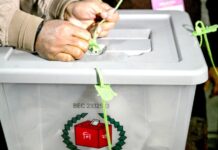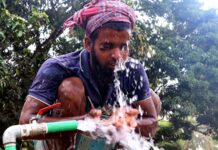
Dr Shamsuddin Ahmed, FRCS, was the head of the department of surgery at Sylhet Medical College in March, 1971. When the genocide against our people started on March 25, he was not surprised or taken aback. He was fully aware of the exploitation of East Pakistan (now Bangladesh) by West Pakistan. As General Yahya Khan postponed the opening of parliament after the Awami League’s landslide victory, he knew something bad was going to happen, and that he had to be prepared.
In early March 1971, he created an emergency medical squad and extra blood bank, and organised planning meetings with students and fellow physicians to get everyone on board. Even though some of them were not prepared to believe what was going to happen, Shamsuddin had long distrusted the Pakistani regime. However, his activism and anti-authoritarian stance had begun long before the oppression of Pakistan.
Dr Shamsuddin, my father, was born in Badarpur of Karimganj subdivision of Sylhet, in British India, on October 1, 1920—the only son of his parents, Iman Uddin Ahmed and Khurshidun Nessa. He attended school and college in Sylhet. He showed good leadership at an early age—he was a scout leader, dormitory captain and volunteer at Hajj camps during his school days. During college, he was the vice president of the all Assam student Muslim Student’s Federation. He volunteered during the devastating Assam floods along with Maulana Bhashani.
He attended Kolkata Medical College and graduated in 1946. As a medical student, he was actively involved in the anti-British movement across all political parties and during the Hindu-Muslim riots in Kolkata, he worked diligently to rescue and treat injured people.
On April 4, 1947, he married Hosn Ara Ahmed, a master’s student in Kolkata university. Later, she became principal of Sylhet Women’s College and a prominent educator and social leader for 35 years in Sylhet. They moved to Sylhet after the partition of British India in 1947, with the hope of building the nation of their dreams.
During his term in PMA, he could clearly see the disparity between east and west Pakistan. He kept giving suggestions to the government to minimise the gap in healthcare and medical education in East Pakistan. By that time, it was obvious that discrimination was rampant in all sectors against East Pakistan.
One of the issues was the Commonwealth Scholarship for higher medical education. All 50 scholarships would go to West Pakistan, even if there were abundant qualified Bengali candidates. He was one of the victims of that discrimination.
From 1957 to 1962, he studied in England for the FRCS with a Burma-Shell Scholarship. He joined Rajshahi Medical college as associate professor of surgery on his return, while his wife was in Sylhet, actively developing the Sylhet Women’s College. It was privatised after independence with only five students and she transformed it to a college on 12 bigha land with a few thousand students by the time she retired in 1984. The family had to stay divided and could get together only during holidays. However, he was incredibly supportive of his wife’s leadership in women’s education and actively supported her in her endeavours. In fact, he took the posting as the civil surgeon in Sylhet in 1965, only to be near his family.
During this period, he founded Jalalabad Blind Welfare Organisation and organised the nation’s first month long Blind Camp. The camp was held during the month of Ramadan for free cataract surgery. This programme was well received throughout the country and was replicated in different places. He also converted the small TB clinic in Sylhet to a TB hospital using the donation of expatriate Sylhetis.
In 1969, he was transferred back to Rajshahi medical college. Political unrest in the country was at its peak. Bangabandhu Sheikh Mujibur Rahman was imprisoned for the Agartala Conspiracy Case. However, Ayyub Khan’s presidency was on the verge of collapse. His demise was hastened by an incident in Rajshahi. A young professor, Dr Shamsuz Zoha, was shot and killed by the Pakistani Army. He was trying to stop a skirmish between demonstrating students and the army.
Dr Shamsuddin operated on Dr Shamsuz Zoha but could not save him. Despite the pressure from the military not to publicise the autopsy report, he organised the first protest meeting in Rajshahi Medical College, condemning the killing of Dr Zoha. The protest movement grew throughout the country and eventually Ayyub Khan had to step down. Sheikh Mujibur Rahman was released and was named Bangabandhu. Dr Shamsuddin was transferred to Sylhet as professor and head of surgery.
The Pakistani regime did not accept the landslide victory of Awami League in the 1970 election and the genocide in East Pakistan started on March 25, 1971.
At the time, Sylhet Medical College Hospital was full of wounded people. Dr Shamsuddin kept operating on his patients day and night. On April 4, freedom fighters from the 2nd East Bengal Regiment attacked Sylhet and the Pakistan army retreated to Salutikor Airport, north of town. Sylhet city had by now become a battlefield. Everyone who could, fled the town.
The head of surgery at the time, Dr Shamsuddin, decided to move in and stay at the hospital. He did not want to abandon his patients. He was strongly advised by his friends and family to leave the town, but he did not. His clinical assistant Dr Shyamol Kanti Lala was ready to leave too. However, he said, “sir, I will stay with you till the end.”
On April 9, the Pakistan army regained control of the city and attacked the hospital. They called him out of the Operating Theatre, rounded up everyone who were working with him and shot and killed them in the hospital campus. The victims were professor Shamsuddin Ahmed, Dr Shyamol Kanti Lala, male nurse Mahmudur Rahman, ambulance driver Korban Ali and a few unnamed patients and their relatives.
While a curfew was imposed for the next three days, the news spread like wildfire. Their decomposing bodies were found stacked up against a shed. He was identified by his uncle and was buried during a short break of the curfew. His companions were also buried in two different graves nearby.
Today, their graveyard is known as the Martyred Intellectual’s Complex in Sylhet. Dr Shamsuddin spent his whole life working for the cause of humanity. His ultimate sacrifice was giving his life inside his hospital and taking care of his patients, knowing full well the risks he was facing. Dr Shamsuddin’s father, a British Railway Guard, was immensely proud of his son. He used to say that his son was his best asset.
Dr Shamsuddin did live up to his father’s dream. His own advice to his children was, “be a good human being, always show empathy, be kind and don’t be afraid to do what is right.”
Maleka Zafreen Ahmed is the daughter of Dr Shamsuddin Ahmed.









